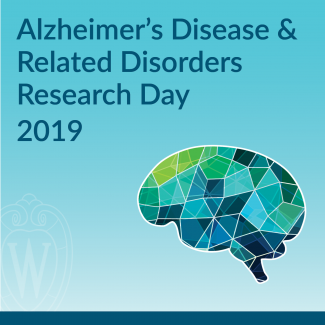
Each year, the Wisconsin Alzheimer's Disease Research Center presents the Alzheimer's Disease & Related Disorders Research Day. The event is designed to encourage collaboration and promote scientific thought among faculty, students, and researchers from a wide range of disciplines across the UW-Madison campus. This year's program will examine what population research tells us about Alzheimer's disease risk.
Alzheimer's Disease & Related Disorders Research Day is sponsored by the Wisconsin Geriatric Education Center (WGEC).
Agenda
View a PDF of the 2019 Alzheimer's Disease & Related Disorders Research Day event program, which includes the agenda.
Poster Session
View a PDF of the Poster Session Abstracts book. Read about the winners of the Best Abstract Awards.
Event Recap
The Wisconsin ADRC hosted more than 160 attendees at its 2019 Alzheimer’s Disease & Related Disorders Research Day. The program examined what population research tells us about Alzheimer’s disease risk. More than 40 students, trainees, postdocs, fellows, and junior faculty members submitted scientific abstracts to the poster session held in conjunction with the event. Below are videos of the research day presentations.
Featured speakers

Rachel Whitmer, PhD, University of California, Davis School of Medicine
Dr. Rachel Whitmer is Professor of Public Health Sciences and Chief of the Division of Epidemiology at the University of California Davis. Professor Rachel Whitmer leads the Population Science of Brain Health Laboratory at UC Davis. Her research focuses on using epidemiological methods to reduce inequities in brain aging; especially through study of dementia incidence, cognitive aging, and brain pathology in racial and ethnic minority groups, those with type 1 and type 2 diabetes, and individuals living beyond age 90.
Dr. Whitmer is Principal Investigator of several NIH-funded large cohort studies of dementia and cognitive aging following over 4,000 people, as well the US POINTER Northern California site. Dr. Whitmer also has a leadership role in the IDEAS study leading analyses for health outcomes. Professor Whitmer was the first female Target of Excellence hire to the School of Medicine at UC Davis. Prior to UC Davis she was a Senior Scientist at Kaiser Permanente Division of Research and faculty at University of California San Francisco Department of Epidemiology Biostatistics; she currently holds adjunct appointments at both of these institutions. Dr. Whitmer’s research programs leverage population science and epidemiology to inform cognitive and brain aging in diverse populations that have been historically excluded from research. Dr. Whitmer was the Chair of the Scientific Program for the AAIC from 2016-2018.

Amy Kind, MD, PhD, associate professor of medicine and director of the Health Services and Care Research Program at the University of Wisconsin School of Medicine and Public Health
Dr. Amy Kind, MD, PhD, is director of the Department of Medicine Health Services and Care Research Program and associate professor in the Division of Geriatrics, both within the University of Wisconsin School of Medicine and Public Health. She also is director of the VA Cognitive Care Clinic and attends on the inpatient geriatrics consult service at the William S. Middleton Memorial VA Hospital in Madison, WI.
Dr. Kind is a national leader in the field of neighborhood-level socioeconomic contextual disparities, especially as they relate to brain health and Medicare policy. She has multiple active R01s to support this research from the NIH/National Institute on Minority Health and Health Disparities (NIMHD), the NIH/National Institute on Aging (NIA), and has served as a technical expert on these issues for US State and Federal entities. Dr. Kind also designs, leads and assesses systems interventions that improve care for high-risk older adult patients, including those with dementia, and that are particularly applicable in low-resource and safety-net hospital settings. Some of these programs have disseminated widely.



